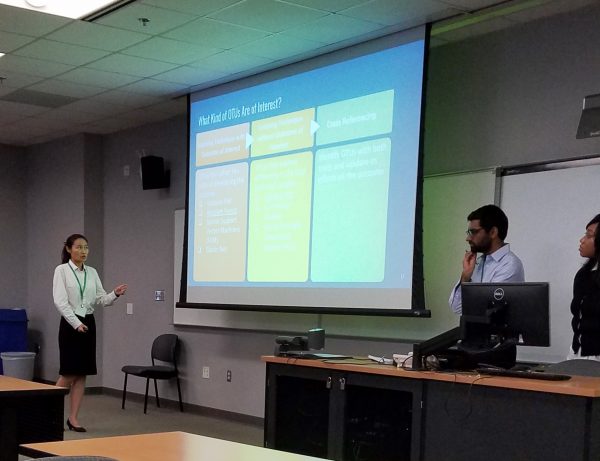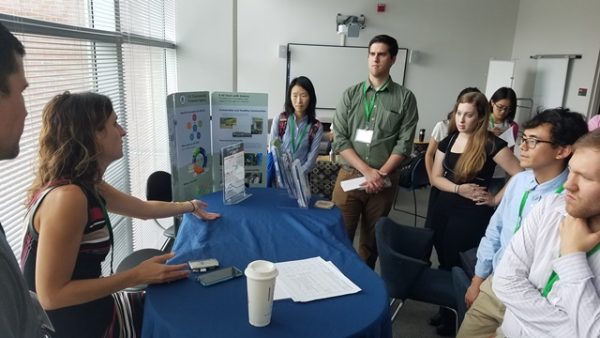
Graduate Students get Practical Experience in Math and Statistics Research at 2017 IMSM

A graduate student and her group present findings on a problem posed by one of the many program partners at the 2017 IMSM Workshop on the campus of North Carolina State University from July 17-26. The workshop exposes graduate students to methods used by industry and national labs to solve real world problems.
SAMSI completed the 2017 Industrial Math/Stat Modeling Workshop for Graduate Students (IMSM ) this past summer. The event was held on the campus of North Carolina State University from July 17-26, and was attended by more than 40 graduate students from across the nation.
The IMSM is an annual educational outreach event that features collaborations with industry, national labs and other governmental organizations. During the workshop graduate students in mathematics, statistics and computational science disciplines are exposed to challenging real-world problems that arise in industrial and government laboratory research.
“This type of summer workshop has been held at N.C. State since 1995,” said Mansoor Haider , a Professor of Mathematics at N.C. State University and the workshop’s organizer. “The IMSM name has been in place for well over a decade now. This reflects the importance of integrating statistics with mathematics and computation in solving modeling problems arising outside of academia.”
Several prominent leaders in industry and national labs provided first-hand experience and mentorship to the students. This year SAMSI was proud to partner with professionals from: Sandia National Laboratories ; Rho, Inc. ; U.S. Army Corps of Engineers , PAREXEL and the Environmental Protection Agency (EPA) among others.
This year’s partners presented problems to the attending students. The students were placed into research groups, and then collectively developed and implemented ways to resolve the issues at hand. The various partner representatives and workshop faculty members provided valuable mentorship and direction to the students. The students also received practical experience in problem-solving and first-hand experience in what it is like to work in a research group in a non-academic setting.
“The need for doctorally trained statisticians and mathematicians in industry and national labs is ever increasing,” said Haider. “By immersing them in an intensive collaborative research experience, we hope to increase students’ awareness of the variety of career options after graduation, and the skills they will need to be successful.”

Graduate students attend a job fair, part of the 2017 IMSM Workshop, on the campus of North Carolina State University from July 17-26. The workshop exposed graduate students to future professional opportunities in the field of mathematics and statistics. It also helped to teach the students various methods used by industry and national labs to solve real world problems.
Some of the problems tackled by this year’s participants included:
- How to integrate large-scale data from open source Google Earth Engine with air quality monitoring across the country in order to provide real-time air quality information to users.
- Using coast line bathymetry data to assist in erosion control – to be used in predicting environmental effects after coastal storms or helping humanitarian aid logisticians to identify effective delivery methods by sea to provide critical relief.
- Determining root causes of allergies in humans by studying the correlation and interactions between microbes in the environment and those inside the nose. Potential applications of this research aim to adapt the design of buildings and control exposure to identified allergens to reduce allergy and asthma among children at risk.
Participants put in long hours, sometimes well into the night. The students worked together and maximized the individual knowledge strengths of group participants to assist in solving their team’s assigned problem. After several days of team research and collaboration with group mentors and faculty, the groups reconvened and presented their findings to their peers and other academic professionals. The partners attending the workshop got valuable responses to the problems they posed, and in some instances, received insight into alternative research avenues or approaches to pursue in the future.
“For many students, this is their first experience tackling mathematical or statistical modeling problems outside of a university research setting,” said Haider. “The workshop is intensive… It nicely mimics unique challenges in industrial research like identifying, formulating, and solving problems in a team, and then refining, coordinating, presenting and reporting on the results, all in a short time period.”
The IMSM is one of the many ways SAMSI helps bring new talent together in order to collaborate with relevant applied math, statistics and computational science organizations. These workshops help to prepare and inspire those considering careers in science and math disciplines for the future.
For more on the Industrial Math/Stat Modeling Workshop and to see research presented from previous workshops, visit: www.samsi.info/imsm-history .

A program partner presents a clinical problem for the students to solve, as a group, during the 2017 IMSM Workshop. The workshop was held on the campus of North Carolina State University from July 17-26. The workshop exposes graduate students to methods used by industry and national labs to solve real world problems.